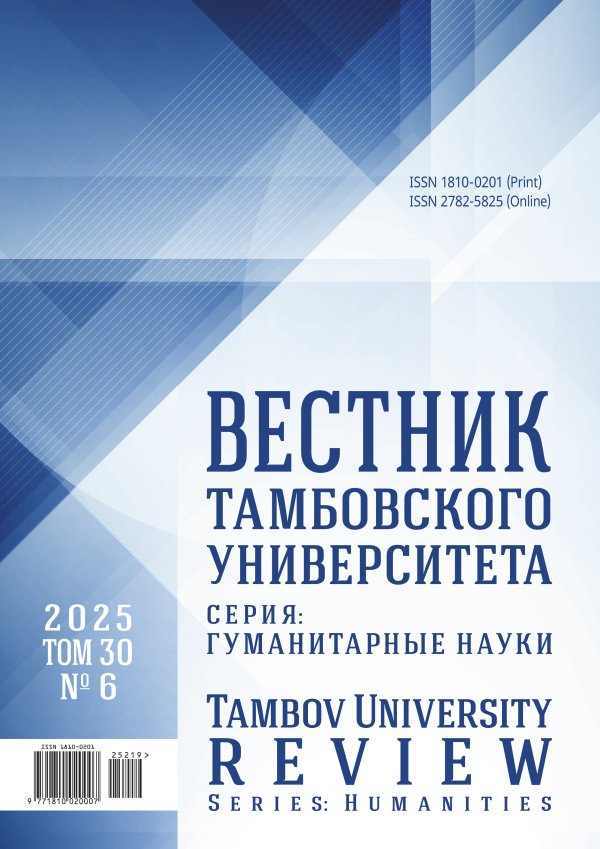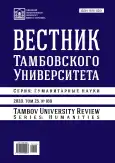Психолого-педагогические условия формирования лексических навыков речи школьников на основе обучающих компьютерных игр
- Авторы: Шмелев Б.А.1
-
Учреждения:
- ФГБОУ ВО «Тамбовский государственный университет им. Г.Р. Державина»
- Выпуск: Том 25, № 189 (2020)
- Страницы: 69-78
- Раздел: ТЕОРИЯ И МЕТОДИКА ОБУЧЕНИЯ ИНОСТРАННОМУ ЯЗЫКУ
- URL: https://bakhtiniada.ru/1810-0201/article/view/298839
- DOI: https://doi.org/10.20310/1810-0201-2020-25-189-69-78
- ID: 298839
Цитировать
Полный текст
Аннотация
На основе многоаспектного анализа понятия «условия» определено понятие «педагогические условия» и проведен его анализ. Были выявлены основные характерные черты понятия «педагогические условия». Рассмотрены различные группы условий, при помощи которых происходит эффективное функционирование педагогической системы. Раскрыты особенности психолого-педагогических условий. Представлен анализ понятия «сензитивность» и основной период его продолжительности. Проведен анализ данного возрастного периода и выявлен его потенциал при обучении. Рассмотрены основные виды деятельности в школьном возрасте (игровая, познавательная, учебная). Далее были предложены психолого-педагогические условия, направленные на формирование лексических навыков речи на основе обучающих компьютерных игр. Первым предложенным психолого-педа-гогическим условием формирования лексических навыков речи на основе обучающих компьютерных игр является мотивация обучающихся развивать лексические навыки речи на основе обучающих компьютерных игр. Представлен анализ понятия «мотивация» и «мотив». Рассмотрены различные виды систематизации мотивации (внешняя, внутренняя), по типу мотиватора (положительная, отрицательная), в зависимости от ее устойчивости (устойчивая, неустойчивая). Также был дан ряд стратегий для увеличения мотивации у учеников. Вторым психолого-педагогическим условием формирования лексических навыков речи на основе обучающих компьютерных игр является сформированность ИКТ-компетентности у обучающихся. Рассмотрены такие понятия, как цифровая компетенция, ИКТ-грамотность. Последним психолого-педагогическим условием формирования лексических навыков речи на основе обучающих компьютерных игр является сформированность ИКТ-компетентности у преподавателя.
Об авторах
Б. А. Шмелев
ФГБОУ ВО «Тамбовский государственный университет им. Г.Р. Державина»
Автор, ответственный за переписку.
Email: shmeliov.bogdan@yandex.ru
ассистент кафедры лингвистики и гуманитарно-педагогического образования педагогического института
Россия, 39200, Российская Федерация, г. Тамбов, ул. Интернациональная, 33Список литературы
- Полонский В.М. Словарь по образованию и педагогике. М.: Высш. шк., 2004. 512 с.
- Андреев В.И. Педагогика творческого саморазвития: Инновационный курс. Казань: Изд-во Казан. ун-та, 1996.
- Дуранов М.Е. Профессионально-педагогическая деятельность и исследовательский подход к ней. Челя-бинск: ЧГАКИ, 2002. 276 с.
- Малыхин А.О. Воспитание морального сознания учеников 5–7 классов на уроках трудового обучения: автореф. дис. ... канд. пед. наук. Киев, 2000. 20 с.
- Лысенко А.В. Психолого-педагогические условия формирования профессионально ценностных ориента-ций будущего учителя музыки: дис. ... канд. пед. наук. Майкоп, 2005. 203 с.
- Журавская Н.В. Профессиональная подготовка специалистов пожарной безопасности в вузах нефтегазо-вой отрасли с использованием индивидуально-дифференцированного подхода: автореф. дис. ... канд. пед. наук. СПб., 2011. 26 с.
- Scrivener J. Learning Teaching: The Essential Guide to English Language Teaching. 3rd ed. MacMillan, 2011. 416 р.
- Леонтьев А.H. Деятельность. Сознание. Личность. М.: Политиздат, 1975. 130 с.
- Пугачев В.П. Мотивация трудовой деятельности. М.: ИНФРА-М, 2011. 394 с.
- Асмолов А.Г. Основные принципы психологического анализа в теории деятельности // Вопросы психоло-гии. 1982. № 2. С. 14-27.
- Плещица С.Г. Основы конфликтологии. СПб.: Изд-во СПбГУЭФ, 2012. 207 с.
- Давыдов В.В. Теория развивающего обучения М.: ИНТОР, 1996. 544 с.
- Маркова А.К. Формирование мотивации учения в школьном возрасте. М.: Просвещение, 1983. 96 с.
- Эльконин Д.Б. К проблеме периодизации психического развития в детском возрасте // Вопросы психоло-гии. 1971. № 4. С. 6-20.
- Щерба Л.В. Преподавание иностранных языков в школе. Общие вопросы теории. М.: Академия ИЦ, 2003. 151 с.
- Асмолов А.Г. Психология личности: культурно-историческое понимание развития человека. М.: Смысл, 2007. 528 с.
- Апатова Н.В. Информационные технологии в школьном образовании. М.: Изд-во РАО, 1994. 228 с.
- Соломатина А.Г. Методика развития умений говорения и аудирования учащихся посредством учебных подкастов (английский язык, базовый уровень): автореф. дис. ... канд. пед. наук. М.: МГГУ им. М.А. Шо-лохова, 2011.
- Маркова Ю.Ю. Методика развития умений письменной речи студентов на основе вики-технологии (анг-лийский язык, языковой вуз): автореф. дис. … канд. пед. наук. М.: МГГУ им. М.А. Шолохова, 2011.
- Чернякова Т.А. Методика формирования лексических навыков студентов на основе лингвистического корпуса (английский язык, языковой вуз): автореф. дис. … канд. пед. наук. М.: МГГУ им. М.А. Шолохова, 2012. 149 с.
- Hampel R., Stickler U. New skills for new classrooms: training tutors to teach language online // Computer As-sisted Language Learning. 2005. Vol. 18. № 4. P. 311-326. doi: 10.1080/09588220500335455
- Compton L. Preparing language teachers to teach language online: a look at skills, roles, and responsibilities // Computer Assisted Language Learning. 2009. Vol. 22. № 1. P. 73-99.
- Сысоев П.В., Евстигнеев М.Н. Компетенция в области использования информационно-коммуни-кационных технологий учителя иностранного языка: определение понятий и компонентный состав // Иностранные языки в школе. 2011. № 6. С. 16-20.
- Евстигнеев М.Н. Структура ИКТ компетентности учителя иностранного языка // Язык и культура. 2011. № 1 (13). С. 119-125.
Дополнительные файлы









